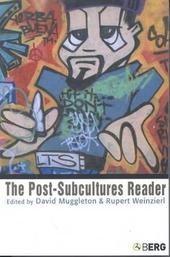
|
The Post-Subcultures Reader
Paperback / softback
Main Details
| Title |
The Post-Subcultures Reader
|
| Authors and Contributors |
Edited by David Muggleton
|
|
Edited by Rupert Weinzierl
|
| Physical Properties |
| Format:Paperback / softback | | Pages:336 | | Dimensions(mm): Height 234,Width 156 |
|
| ISBN/Barcode |
9781859736685
|
| Classifications | Dewey:306.1 |
|---|
| Audience | | General | | Professional & Vocational | |
|---|
| Illustrations |
bibliography, index
|
|
Publishing Details |
| Publisher |
Bloomsbury Publishing PLC
|
| Imprint |
Berg Publishers
|
| Publication Date |
1 December 2003 |
| Publication Country |
United Kingdom
|
Description
Once it was just Mods and Rockers or Hippies and Skinheads. Now we have Riot Grrls and Rappers; Modern Primitives and Metalheads; Goths, Clubcultures and Fetishists; Urban Tribes, New Age Travellers and Internet fan groups. In a global society with a rapid proliferation of images, fashions and lifestyles, it is -unsurprisingly - becoming increasingly difficult to pinpoint what 'subculture' actually means. Enthusiastically adopted by the media and academia, 'subculture' may be a convenient way to describe more unconventional aspects of youth culture, but it does little to help us comprehend the diverse range of youth groups in today's so-called 'postmodern' world. How can we begin to rethink, reformulate and replace outdated notions of 'subcultures' to make them applicable to the experiences of youth in the twenty-first century? And to what extent does this involve the challenging of past orthodoxies about spectacular subcultural styles? From Seattle anarchist punks to UK Asian underground music, Canadian female X-Files fans to Australian dance cultures, this groundbreaking book draws on a wide variety of international case studies to investigate the new relationships among youth subcultural music, politics and taste. Is it possible to work within the existing limitations of 'subculture', or has the concept exhausted its usefulness? Can attempts at re-conceptualization, such as neo-tribes, sub-streams and micro-networks, adequately capture the experience of fragmentation, flux and fluidity that is central to contemporary youth culture? This timely book is the first to challenge and reconsider the use of 'subculture'. In doing so, it questions the possibility and relevance of what might be termed 'post-subcultural studies' and helps to chart the emergence of a new paradigm for the study of youth subculture.
Author Biography
David Muggleton Senior Lecturer in Sociology,University College Chichester Rupert Weinzierl Freelance Researcher in Cultural Studies
Reviews'The Post-Subcultures Reader is a solid textbook for those who want a guide through subcultural theory after the Birmingham Centre's beatification.' Youth Studies Australia, vol. 24, no. 3, 2005
|